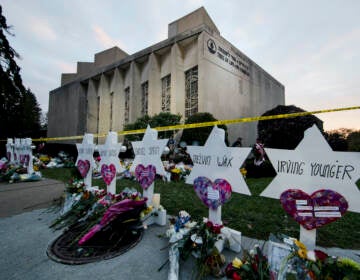Pa. Supreme Court questions attorneys about redactions in clergy report
Listen :58
Pennsylvania Attorney General Josh Shapiro speaks during a news conference about clergy sexual abuse at the Pennsylvania Capitol in Harrisburg, Pa., Tuesday, Aug. 14, 2018. (AP Photo/Matt Rourke)
In the first public arguments in the case, the Pennsylvania Supreme Court heard oral arguments Wednesday over redactions to the scathing grand jury report released last month alleging widespread child sexual abuse at the hands of Roman Catholic clergy in six of the state’s eight diocese.
The high court’s hearing held at Philadelphia’s City Hall was standing room only.
Attorneys Justin Danilewitz and Christopher Hall, who represent about 30 clergy members, whose names and abuse allegations have been stripped from the nearly 900-page report, argued that their clients were denied meaningful due process by the investigating grand jury.
They say the report’s findings are riddled with errors and gross speculation.
“Our problem is the use of a proper tool, put in the wrong hands, used in the wrong way,” Danilewitz argued to the justices.
He claimed that if redactions were removed from the report, the clergy members would be “named” and “shamed” for faulty and incendiary allegations of child sexual abuse, without ever being afforded the opportunity of cross examination in civil or criminal proceedings.
Danilewitz and Hall contended that Attorney General Josh Shapiro — who said that the clergy members are “cowards” and a part of the cover-up to the cover-up — has tainted the process beyond repair. They argued that the only available remedy would be to accept the interim, redacted report as the final version.
Justice Max Baer pushed back against Danilewitz’ claim that the process has been tainted. He said he doubted that the average Pennsylvanian would be able to name five priests in the report.
“They’re not Bill Cosby. They’re not Jerry Sandusky,” Baer said. “They’re just one of 300 priests named in the report.”
Danilewitz also argued that the attorney general’s office has already achieved what is permissible by the rules involving grand jury investigations and that there has already been legislative action based on the recommendations outlined in the report.
He pointed to the recent amendment approved by the state House, that would allow a two-year window for victims of child sex abuse to bring civil lawsuits against their abusers when statute of limitations have already expired, as evidence of achieving those goals.
Therefore, he says, no other action is required.
The attorney general’s office disagreed.
Ronald Eisenberg, senior appellate counsel for the A.G., argued that the court should recall the investigating grand jury and offer the anonymous clergy the chance to testify under oath about the allegations and evidence against them.
He said the A.G. receives more calls and more information about the case everyday, and that some tips may lead to prosecutable crimes.
Justice David Wecht offered Eisenberg a skeptical question.
“Why is it not adequate for you to live with the interim report?” he asked.
Eisenburg insisted that accepting the redacted report as final could potentially impact future grand jury reports.
“The only argument for cutting things off right now — is that no process is available to be fair — and if that’s true for these petitioners, it’s going to be true for all future grand jury reports,” Eisenberg said in an interview after the hearing.
Eisenberg also called the characterization of the report as inaccurate and full of errors a “wild claim.” He said reconciling those disputes would be another reason to recall the grand jury and would strengthen the reliability and forcefulness of the grand jury’s recommendations to lawmakers.
It is unclear when the Pennsylvania Supreme Court will issue its decision on the case.
WHYY is your source for fact-based, in-depth journalism and information. As a nonprofit organization, we rely on financial support from readers like you. Please give today.





